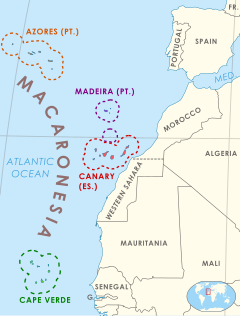24°15′24″N 22°28′16″W / 24.25667°N 22.47111°W

Macaronesia (Portuguese: Macaronésia; Spanish: Macaronesia) is a collection of four volcanic archipelagos in the North Atlantic Ocean, off the coast of North Africa and Europe.[1][2] Each archipelago is made up of a number of Atlantic oceanic islands, which are formed by seamounts on the ocean floor whose peaks have risen above the ocean's surface.[3]
Each of the archipelagos is a distinct political entity: the Azores and Madeira are autonomous regions of Portugal, the Canary Islands is an autonomous community of Spain, while Cape Verde is a sovereign state and member of the United Nations.[4][5][6] Politically, the islands belonging to Portugal and Spain are part of the European Union. Geologically, most of Macaronesia is part of the African tectonic plate. The Azores are located in the triple junction between the African, Eurasian, and North American plates.[Note 1][7][8]
In one biogeographical system, the Cape Verde archipelago is in the Afrotropical realm while the other three archipelagos are in the Palearctic realm. According to the European Environment Agency, the three archipelagos within the European Union constitute a unique bioregion, known as the Macaronesian Biogeographic Region.[9] The World Geographical Scheme for Recording Plant Distributions places the whole of Macaronesia in its botanical continent of Africa.[10]
In 2022, Macaronesia had an estimated combined population of 3,222,054 people; 2,172,944 (67%) in the Canary Islands, 561,901 (17%) in Cape Verde, 250,769 (8%) in Madeira, and 236,440 (7%) in the Azores.[11][12][13]
- ^ "Where Is Macaronesia?". WorldAtlas. 25 May 2018. Retrieved 8 July 2019.
- ^ "The Nine Islands of the Azores". Azores. 20 November 2016. Retrieved 8 June 2024.
- ^ Carracedo, Juan Carlos; Troll, Valentin R. (1 January 2021). "North-East Atlantic Islands: The Macaronesian Archipelagos". Encyclopedia of Geology. pp. 674–699. doi:10.1016/B978-0-08-102908-4.00027-8. ISBN 9780081029091. S2CID 226588940.
- ^ "Countries: UCLA Africa Studies Center". International.UCLA.edu. Retrieved 18 June 2019.
- ^ "Canary Islands – Spain". greenwichmeantime.com. Retrieved 18 June 2019.
- ^ "Makavol 2010 Teneguia Workshop" (PDF). Avcan.org. Archived from the original (PDF) on 25 April 2012. Retrieved 2 September 2013.
- ^ Nunes, João Carlos (2014). "The Azores Archipelago: Islands of Geodiversity". In Erfurt-Cooper, Patricia (ed.). Volcanic Tourist Destinations (PDF). Springer. p. 57. ISBN 978-3-642-16190-2. Archived from the original on 14 January 2024. Retrieved 14 January 2024.
- ^ Marques, Fernando; Catalão, João; Hildenbrand, Anthony; Costa, Ana; Dias, Nuno (21 October 2014). "The 1998 Faial earthquake, Azores: Evidence for a transform fault associated with the Nubia–Eurasia plate boundary?" (PDF). Tectonophysics. 633: 116, 122. doi:10.1016/j.tecto.2014.06.024. Archived from the original on 14 January 2024. Retrieved 14 January 2024.
- ^ "The Macaronesian Region". ec.europa.eu. Retrieved 8 July 2019.
- ^ Cite error: The named reference
WGSRPDwas invoked but never defined (see the help page). - ^ "Población por comunidades y ciudades autónomas y sexo". Retrieved 15 November 2022.
- ^ "Population, total - Cabo Verde". World Bank. Retrieved 17 November 2022.
- ^ "Resident population (No.) by Place of residence, Sex and Age group; Decennial - Statistics Portugal, Population and housing census - 2021". INE. Retrieved 17 November 2022.
Cite error: There are <ref group=Note> tags on this page, but the references will not show without a {{reflist|group=Note}} template (see the help page).